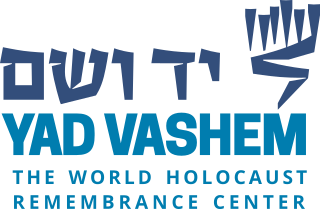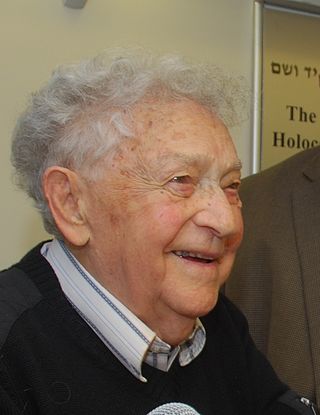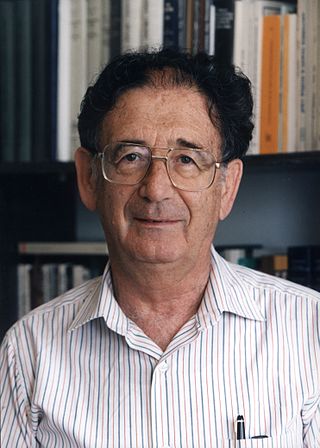
Yad Vashem is Israel's official memorial to the victims of the Holocaust. It is dedicated to preserving the memory of the Jews who were murdered; echoing the stories of the survivors; honoring Jews who fought against their Nazi oppressors and gentiles who selflessly aided Jews in need; and researching the phenomenon of the Holocaust in particular and genocide in general, with the aim of avoiding such events in the future. Yad Vashem's vision, as stated on its website, is: "To lead the documentation, research, education and commemoration of the Holocaust, and to convey the chronicles of this singular Jewish and human event to every person in Israel, to the Jewish people, and to every significant and relevant audience worldwide."

Yitzhak Arad was an Israeli historian, author, IDF brigadier general and Soviet partisan. He also served as Yad Vashem's director from 1972 to 1993, and specialised in the history of the Holocaust.

Yehuda Bauer is a Czech-born Israeli historian and scholar of the Holocaust. He is a professor of Holocaust Studies at the Avraham Harman Institute of Contemporary Jewry at the Hebrew University of Jerusalem.
Names of the Holocaust vary based on context. "The Holocaust" is the name commonly applied in English since the mid-1940s to the systematic extermination of six million Jews by Nazi Germany during World War II.

The International Holocaust Remembrance Day, or the International Day in Memory of the Victims of the Holocaust, is an international memorial day on 27 January that commemorates the victims of the Holocaust, which resulted in the genocide of one third of the Jewish people, along with countless members of other minorities by Nazi Germany between 1933 and 1945, an attempt to implement its "final solution" to the Jewish question. 27 January was chosen to commemorate the date when the Auschwitz concentration camp was liberated by the Red Army in 1945.

Gideon Greif is an Israeli historian who specializes in the history of the Holocaust, especially the history of the Auschwitz concentration camp and particularly the Sonderkommando in Auschwitz. He served as a visiting lecturer for Jewish and Israeli History at the Schusterman Center for Jewish Studies at the University of Texas at Austin during the academic year 2011–2012. He headed a commission that issued a report in July 2021 that denied that the killing of Bosnian Muslims at and around Srebrenica in July 1995 constituted genocide.

Dina Porat is an Israeli historian. She is professor emeritus of modern Jewish history at the Department of Jewish History at Tel Aviv University and the chief historian of Yad Vashem.

Yechiam Weitz is an Israeli professor and historian.
David Bankier was a Holocaust historian and head of the International Institute for Holocaust Research at Yad Vashem.
The assertion that the Holocaust was a unique event in human history was important to the historiography of the Holocaust, but it has come under increasing criticism in the twenty-first century. Related claims include the claim that the Holocaust is external to history, beyond human understanding, a civilizational rupture, and something that should not be compared to other historical events. Uniqueness approaches to the Holocaust also coincide with the view that antisemitism is not another form of racism and prejudice but is eternal and teleologically culminates in the Holocaust, a frame that is preferred by proponents of Zionist narratives.
Leni Yahil (1912–2007), née Leni Westphal, was a German-born Israeli historian, specializing in the Holocaust and Danish Jewry.
Livia Rothkirchen was a Czechoslovak-born Israeli historian and archivist. She was the author of several books about the Holocaust, including The Destruction of Slovak Jewry (1961), the first authoritative description of the deportation and murder of the Jews of Slovakia.
Jean Ancel was a Romanian-born Israeli author and historian; with specialty in the history of the Jews in Romania between the two World wars, and the Holocaust of the Jews of Romania.
The Yad Vashem International Book Prize for Holocaust Research is an annual award by Yad Vashem in recognition of high scholarly research and writing on the Holocaust or its antecedents and aftermath published two years preceding the year of the award. It was established in 2011 in memory of Abraham Meir Schwartzbaum, Holocaust survivor, and his family who was murdered in the Holocaust.
Daniel Romanovsky is an Israeli historian and researcher who has contributed to the study of the Holocaust in the Soviet Union under German occupation in World War II. Romanovsky was a Soviet refusenik politically active since the 1970s. Private seminars on the history of the Jews were held in his Leningrad apartment in the 1980s. Research on the topic was difficult in the Soviet Union because of government restrictions. In the 1970s and 1980s Romanovsky interviewed over 100 witnesses to the Holocaust, including Jews, Russians, and Belarusians, recording and cataloguing their accounts of the Final Solution.

Jan Zbigniew Grabowski is a Polish-Canadian professor of history at the University of Ottawa, specializing in Jewish–Polish relations in German-occupied Poland during World War II and the Holocaust in Poland.

Esther Farbstein is an Israeli historian, researcher, author, and lecturer. Considered the leading Haredi scholar of the Holocaust, she focuses on the spiritual responses of Jews to Nazi persecution. She has introduced new sources for academic research on the Holocaust, and has also shepherded the incorporation of Holocaust education in Haredi girls schools. In 1994, she founded and became head of the Center for Holocaust Studies at Michlalah–Jerusalem College in Bayit Vegan, Jerusalem. She is the author of numerous books, articles, and monographs in Hebrew and English.
Dalia Ofer was the Professor of Holocaust and East European Studies at the Institute of Contemporary Jewry, The Hebrew University of Jerusalem.
Dan Michman is a Jewish historian. He is the head of the International Institute for Holocaust Research at Yad Vashem in Jerusalem and incumbent of the John Najmann Chair of Holocaust studies.
Amit Varshizky is an Israeli scientist specializing in intellectual and cultural history of Nazi Germany, racial science and racial philosophy in early 20th-century Germany, and political theology and secularization theory with focus on modern German philosophy.








